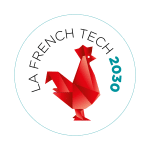
BY LAURENCE, MENTOR MY JOB GLASSES & EDUCATION AND LANGUAGE OFFICER
Until secondary school, I dreamed of becoming a teacher. Although my professional project gradually changed afterwards, I still wanted to leave my mark and make an impact in the educational field.
Today, I am a Language and Education Officer, a role whose existence was totally unknown to me beforehand! To lift the veil on this sector and to throw light on the paths that can let students to where I am today, I chose to become involved as a mentor on My Job Glasses at the end of 2019. By sharing my story and experiences, my main wish is to inspire young people.
EDUCATIONAL COOPERATION: WHAT’S ITS LINK WITH DIPLOMACY?
Educational cooperation refers to actions that allow the development of projects in the educational sector in a given country. Two countries agreeing to join forces, analyse the strengths and weaknesses of the local educational sector and reflect hand in hand on the projects to promote to find ways of improvement in both sides.
This approach is part of what is known today as “soft power In politics (and particularly in,others through appeal and attraction.)“, also known as cultural or influence diplomacy. In the case of France, educational cooperation focuses mostly on guaranteeing access to quality education and stretching the knowledge of French language.
What structures do you work for when you are involved in French educational cooperation? The French cultural network abroad (Alliances Françaises, Instituts Français, Service de Coopération et d’Action Culturelle, French Embassies, Lycée Français, etc.) are the structures that recruit most educational cooperation agents in France. The Alliances Françaises and Instituts Français are cultural and French language teaching centres, which differ in their status. The Alliances Françaises, unlike the Instituts Français, are in fact associations under local law in the various countries where they are located.
In addition to the French institutions mentioned above, there are other players in the educational cooperation field such as the Agency for the Teaching of French Abroad (AEFE), France Education International (FEI), Mission Laïque Française (MLF), Réseau Canopé, the International Departments of the French Universities, etc.
WHAT ARE THE DIFFERENT JOBS IN THE EDUCATIONAL COOPERATIVE?
Roles include titles such as Educational Cooperation Officer, Cooperation Attaché for French, Project manager and Project officer, just to name a few. Tasks are diverse and vary from one position to another, but also from one country to another.
In my particular case, I work on multiple projects at the same time:
- Facilitating meetings between different teams and organisation, specially between the Alliances Françaises and other institutional partners in Kenya
- Writing minutes, reports, summary notes, diplomatic notes and emails
- Opening discussions with teachers and students
- Visiting French schools and resource centres
- Promoting existing school networks (sharing pedagogical resources and information, setting up training)
- Developping training content with partners
- Managing social platforms (mostly Facebook and LinkedIn)
- Creating communication assets (often on Canva)
- Planning events
- Monitoring the budget for upcoming events (budget forecast, payment tracking, etc.) payment and expenses, etc.)
- Training to develop my skills
WHAT DO I LIKE BEST ABOUT MY DAILY WORK?
As an educational and linguistic mission officer, I particularly enjoy discovering the satisfactory outcome of an event that has been planned for several weeks. For the production of a film with an educational scope, for example, I marvel at its screening and the ensuing exchange between the director and the teachers who were won over.
I love the reality of an encounter with a writer, the progress made by the teachers who can now skillfully handle new literary tools and, above all, the many beautiful encounters made along the way! Some teachers or students make a greater impression on us than others and we tend to develop a particular connection with them. One of my most cherished memories concerns a teacher who had taken part in a training course at the Alliance Française de Banjul who I got on with really well. He chose to call his daughter “Laurence” when she was born because he wanted her to develop the same qualities that he appreciated in me.
Such a moving attention!
WHAT ARE THE DIFFICULTIES OF WORKING FOR THE FRENCH DIPLOMACY?
The high degree of autonomy and the high degree of responsibility inherent in the missions I carry out also lead to a significant workload during the week, and often at weekends.
Being involved in several projects at the same time, sometimes give me the impression of not being focused enough. In addition, the diplomatic and institutional context require lots of verifications and imply dealing with administrative delays too.
WHAT ARE THE ESSENTIAL SKILLS TO SUCCEED IN FRENCH DIPLOMACY?
Among the indispensable soft skills, I would include the following:
- Having good interpersonal skills to interact with multiple players
- Keeping one’s enthusiasm even when situations become frustrating
- Expressing yourself in a diplomatic manner
- Being responsive
- Having a strong adaptability to different cultural contexts
- Being able to manage time and stress
- Working fast, well and hard
Furthermore, it is essential to have excellent writing, intercultural and communication skills. It is important to be able to speak in public, to speak fluent French and English and to write clearly and concisely.
WHAT TYPES OF EMPLOYMENT CONTRACTS ARE THERE IN THE FRENCH DIPLOMATIC SERVICE?
There are different types of employment contracts abroad.
The local contract, which involves signing an agreement according to the labour laws of the host country. This contract implies affiliation to the local health insurance regime and as well as to their taxes system. Some institutions agree to register their French employees with a local contract with the Caisse des Français à l’Etranger (CFE), so that they benefit from health and retirement benefits similar to those offered in France.
The Volontariat International en Administration (VIA) offers an expat experience to young professionals up to 28 years old and includes attractive working conditions, salary and responsibilities.
In addition, a large number of positions are available for so-called “titular” staff (who have passed an examination validated by the Ministry of Europe and Foreign Affairs) or “contractual” staff (independent collaborators, not attached to the MEAE or any other ministry). Most of these positions are available on the “transparency” website.
Finally, there is a large number of International Technical Expert (ITE) positions to be filled in too.
HOW CAN I GET A ROLE WITHIN THE SERVICE OF EDUCATIONAL COOPERATION?
Let me share with you some tips that helped me to get into this sector back in the day:
1) Be bold and multiply unsolicited applications, combining them with telephone follow-ups as soon as possible. You will make more of an impression on employers.
2) Browse the websites of the organisations that interest you, paying particular attention to the “Organisation chart” or “Our team” pages. Then try to get in touch with these people on LinkedIn and find out more about their day-to-day tasks. You’ll only be more aware of the realities of the sector.
3) Some capitals are particularly popular among expats and competition on the job market is therefore tougher. Don’t be afraid to move to “smaller countries “ which are less attractive at first glance, but which will allow you to develop your skills and get more responsibilities. You will then multiply your chances of getting a job in the country of your choice!
4) Bonus advice: go to My Job Glasses and find out all you can about the pros and cons of this sector and start networking at the same time.
WHY DID I CHOOSE TO WORK IN EDUCATIONAL COOPERATION?
By getting involved in French educational cooperation, I am expressing my desire to make a contribution to the educational sector. What motivates me and what pushes me to do more and more for this cause is above all the well-being of teachers and students, but also the promotion of equal opportunities which means providing access to quality education in all countries in the world.


